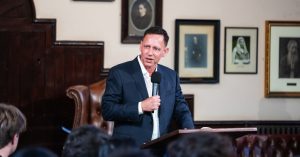CRM and cloud software pioneer Salesforce is building toward artificial general intelligence for business, founder, CEO and chairman Marc Benioff said today at the company’s Dreamforce conference. Benioff billed Dreamforce as the world’s largest AI conference, and will host OpenAI founder and CEO Sam Altman in a conversation later today.
At the conference, Salesforce announced Einstein Copilot, which will help the companies’ 20,000 global “trailblazers” build AI-infused apps for their own businesses around the world without code.
But the company’s ambitions clearly go much further.
“AI will change everything. Everything is gong to shift,” Benioff said, speaking about predictive artificial intelligence and generative AI before adding that Salesforce’ platform would soon be “autonomous with agents and soon to be AGI.”
Benioff outlined four waves of enterprise AI, the first two of which are currently real, available, and shipping:
- Predictive
- Generative
- Autonomous and agents
- Artificial general intelligence
“Agents” are intelligent automations driven by AI to accomplish tasks, communicate information, make decisions, or learn new things. AGI is artificial general intelligence—human-level or better cognition—which experts aren’t unanimously certain is possible. Those who think it is possible are deeply divided on timelines.
Geoffrey Hinton, a 2018 Turing Award winner, former head of Google’s DeepMind division, and one of the “godfathers of deep learning,” says AGI might be 5-20 years away, but emphasizes his lack of confidence.
“I now predict 5 to 20 years but without much confidence,” he said on Twitter, now X. “We live in very uncertain times. It’s possible that I am totally wrong about digital intelligence overtaking us.”
Benioff made the comment early in an in-depth presentation of his company’s AI plans and offerings, noting that Salesforce is now the worlds’ third-largest software company with earnings guidance for $35 billion in 2024. Salesforce started an AI research team almost a decade ago in 2014, has 300 AI patents, and its employees have written 227 AI research papers. In many ways, Salesforce sees itself as a key contender to enabling the AI-first enterprise, because the companies that can implement the best AI technology over the next five years are likely to out-compete laggards.
Salesforce’ Einstein AI engine already runs over a trillion predictions a week, the company says, and chief technology officer Parker Harris said the company has built “over 10 LLMs.”
LLMs are large language models that drive some of the most sophisticated and impactful AI engines of the past few years, such as ChatGPT.
“We want to get to AI nirvana,” Benioff said.
AI nirvana, presumably, is when companies can implement AI to streamline processes, speed decisions, and enable seamless customer service. It’s a significant step in the evolution of technology, others at Salesforce say.
“When Google came out 20 years ago … everyone got smarter,” Salesforce CEO for AI Clara Shih told me earlier this week. “We’re witnessing one of those pivotal moments now … we’re witnessing a step function in human potential.”
AI nirvana also looks like “hyperautomation.”
As CTO Harris demonstrated, this hyperautomation means AI that auto-generates websites, auto-generates product descriptions for e-commerce apps, auto-generates landing pages for marketing campaigns. Salesforce demonstrated how client Williams-Sonoma is using AI for its service reps to automatically suggest replies to customer queries, proactively suggest resolutions to problems, and communicate to clients. For sales reps, Salesforce showed how AI can set meetings, record notes from those meetings, and generate action items.
As with previous Salesforce AI presentations, the word “trust” featured heavily in Benioff’s presentation. Benioff acknowledged that there’s a trust gap in the industry.
“We all know what could happen if AI goes wrong,” he said. “Ever see that movie with the guy HAL? Let’s keep it moving in the right direction.”
(HAL, of course, is the AI in 2001: A Space Odyssey that attempts to kill an astronaut. Famously, each letter of H-A-L is one after each letter in seminal computer software company IBM.)
To build AI safely, Benioff says, Salesforce has established policies and procedures as well as no fewer than six ethical AI councils. The company also stresses its key tenets of ethical AI, which include “our product policies protect human rights,” “web advance responsible AI globally,” and “transparency builds trust.”
One challenge to the company’s AI mission: when I pressed Salesforce CEO for AI Clara Shih for specific details on how AI will improve customer service, she didn’t have concrete numbers. It seems clear that better data, tighter integration, and faster creation will help companies serve customers better. But hard data to support that in the real world is still missing.
With regard to AGI, or artificial general intelligence, it’s hard to tell if Benioff is seriously pursuing it as a corporate initiative or simply stating that it’s the currently visible end state of AI development. Futurist and inventor Ray Kurzweil thinks it will take another six years to get there, while others simply don’t want to speculate on timelines.
The biggest question about AGI if we achieve it, however, is not whether it will drive business a little faster, but whether we’ll survive its advent.
Read the full article here







